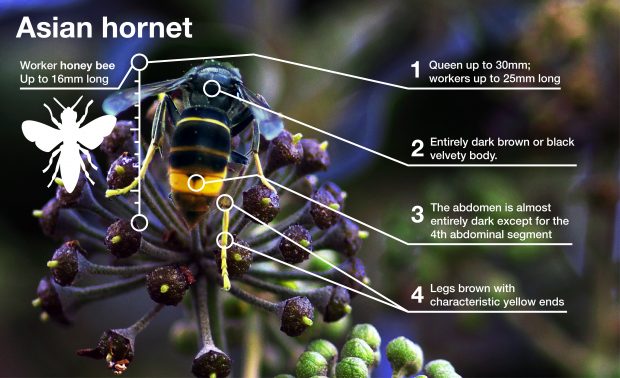
Farmers and landowners are being asked to keep a lookout for the Asian hornet, an invasive pest that was first seen in the UK in 2016.
Concerns are growing about the spread of Asian hornets across the country after an unprecedented number of sightings were made in 2023.
Numbers of the insect increased dramatically last year and there are fears that it could have a catastrophic impact on British honeybees and other pollinators.
The Asian hornet is a large wasp native to the Far East – China, India and Korea. They are active mainly between April and November, with a peak in August and September.
Although slightly smaller than the native European hornet, this invasive pest is a voracious specialised predator of honeybees, capable of wiping out beehives.
A single Asian hornet can kill 30-60 honeybees per day, experts say, and it can also predate a range of native insects like bumblebees, flies and spiders.
By doing so, there are fears it can alter the biodiversity in regions where it is present, and it can be a health risk for people allergic to wasp stings.
In 2023, there was a significant increase with 74 nests found and destroyed in over 50 locations across the southeast, but the majority in Kent.
Defra said: “Invasive species threaten our native biodiversity and cost the economy billions every year, which is why we support the Invasive Species Inspectorate in carrying out their role to protect the nation’s biosecurity."
How do I report sightings?
If you think you have spotted an Asian hornet or its nest, firstly be careful not to get stung.
The sting is no worse than our native wasps and bees, but as with any venom, there is the risk of an allergic reaction.
Try to get a photo, or collect the hornet if it is already dead.
You can then visit the Asian hornet report page of the UK Centre for Ecology & Hydrology to report the sighting for further investigation.
Alternatively you could use the Asian Hornet Watch app to report sightings – it’s free to download from Apple and Android app stores.
